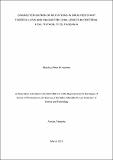Characterization of mutations in drug resistant tuberculosis and diagnostic challenges in referral health facilities, Tanzania
Abstract
Tuberculosis remains one of the world’s deadliest infectious diseases in resource-limited settings, including Tanzania. Diagnostic challenges and minimal information on resistant tuberculosis complicate building effective management strategies. The current study employed whole genome shotgun sequencing and genotyping methods to characterize genetics of drug resistant tuberculosis strains and diagnostic impedes of tuberculosis in Tanzania. A total of 134 positive sputa from collected at Central Tuberculosis Reference Laboratory from different parts of the country. Forty patients were regarded as multi-drug resistant tuberculosis (MDR-TB), of which 18 (45%) were classified as relapse cases. The remaining 94 were smear-positive culture-negative samples and treated as susceptible tuberculosis. Sequence analysis of 40 MDR-TB isolates identified a set of genetic markers (including additional variants) in the following known drug-resistant genes: katG, inhA, embCAB, ethA, inhA, rpoB, rpoC, rpsL, gyrA, eis, and pncA. Additionally, there was evidence of positive selection in other three novel genomic regions namely: ndhC, ndhI and ndhK. Sequence analysis also identified one isolate of M. yongonense, the first case to be described in Tanzania, suggesting that the patient was misdiagnosed with multi-drug resistant tuberculosis. Out of 94 smear-positive but culture negative sputa, 25 (26.60%) were GeneXpert® mycobacteria TB positive. Repeat-culture identified 11/94 (11.70) as culture positive, of which 5 were Capilia TB-Neo positive and confirmed by GenoType MTBC to be Mycobacterium tuberculosis/Mycobacterium canettii. The remaining 6 Capilia TB-Neo negative samples were typed by GenoType® CM/AS and identified 3 (3.19%) nontuberculous mycobacteria, 2 Gram positive bacteria, and 1 isolate tested negative, together, making a total of 6/94 (6.38%) confirmed false smear-positives. Overall, 28/94 (29.79%) isolates were confirmed TB cases while 60 (63.83%) remained unconfirmed tuberculosis cases. These findings on misdiagnosis and the suggestive of novel resistance-associated mutations in resistant tuberculosis emphasize the need for accurate molecular diagnostic tests for delineating the tuberculosis cases and their drug susceptibility profiles in clinical settings.

